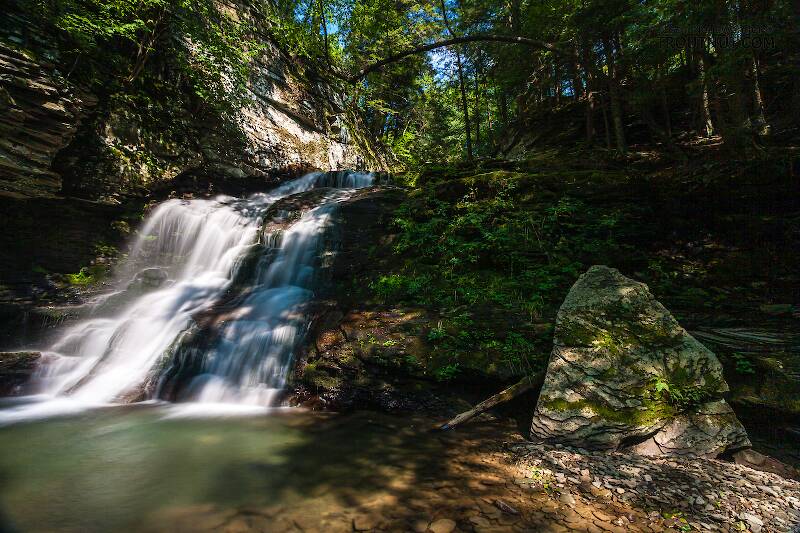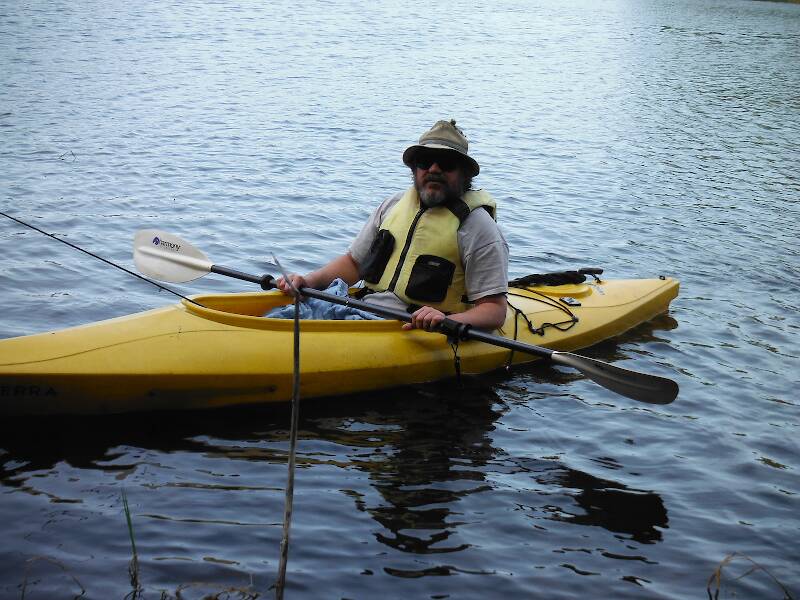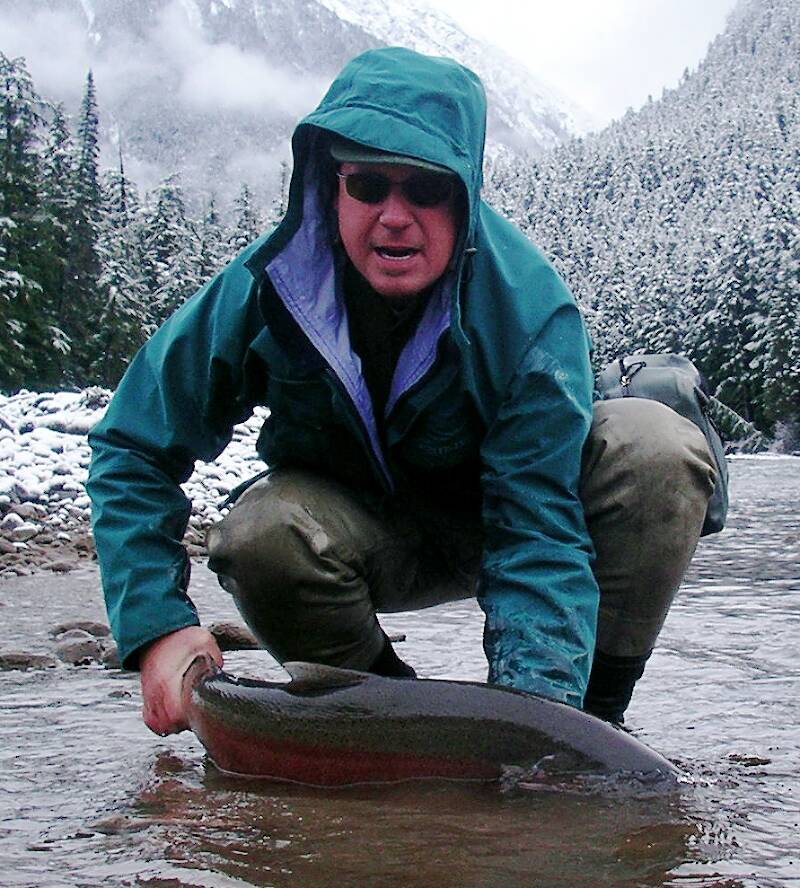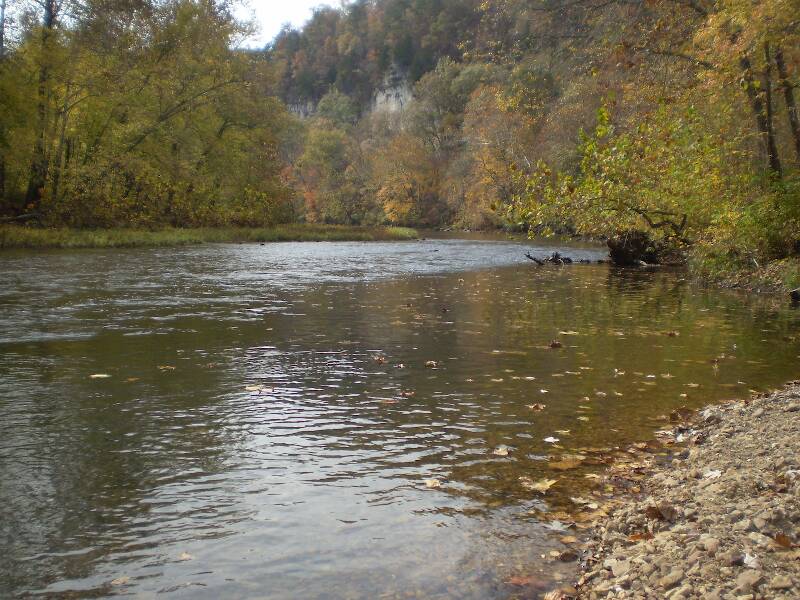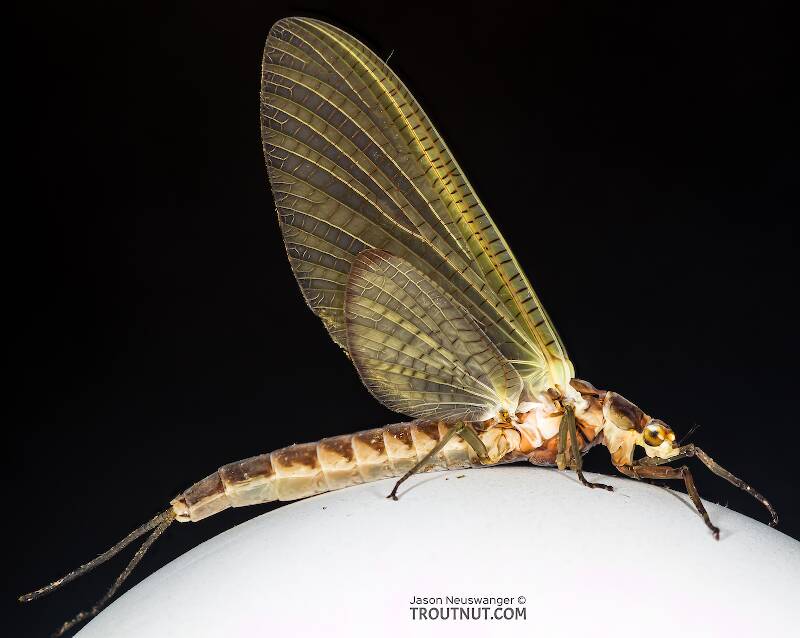
Hex Mayflies
Hexagenia limbata
The famous nocturnal Hex hatch of the Midwest (and a few other lucky locations) stirs to the surface mythically large brown trout that only touch streamers for the rest of the year.
Featured on the forum
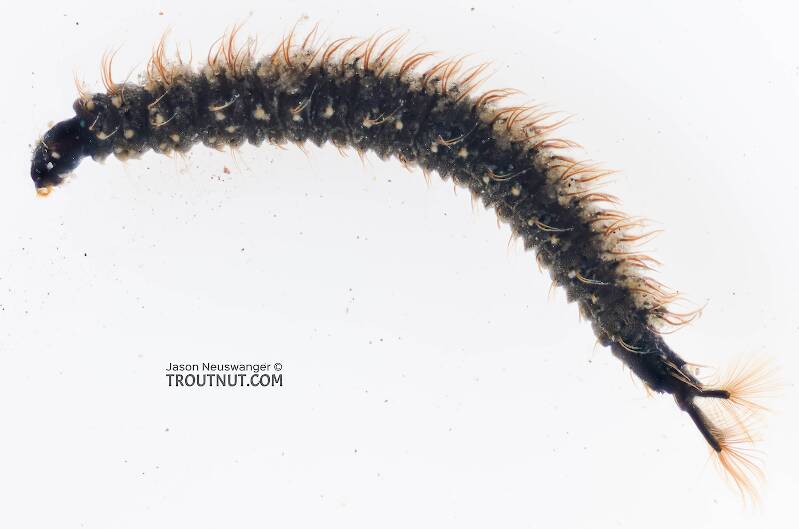
This wild-looking little thing completely puzzled me. At first I was thinking beetle or month larva, until I got a look at the pictures on the computer screen. I made a couple of incorrect guesses before entomologist Greg Courtney pointed me in the right direction with Psychodidae. He suggested a possible genus of Thornburghiella, but could not rule out some other members of the tribe Pericomini.

Troutnut is a project started in 2003 by salmonid ecologist Jason "Troutnut" Neuswanger to help anglers and
fly tyers unabashedly embrace the entomological side of the sport. Learn more about Troutnut or
support the project for an enhanced experience here.
Sayfu
Posts: 560
Posts: 560
Sayfu on Sep 28, 2011September 28th, 2011, 5:09 am EDT
When I moved to Idaho Falls, and began fishing the SF of the Snake the old time SF anglers often talked about the success of a Renegade pattern. It still is today a hot fly to use on the SF. They fish it drag free, then will draw it under, and strip it back catching fish with either presentation. I seldom hear of it used small, usually #12, or bigger, a lot bigger in the case of the double renegade patterns. I will not use one as I can not justify why a fish would eat one! Hackle in the back, and hackle up front? White hackle forward? Anyone have a thought as to why a trout would want a Renegade pattern? I just listened to an incredible success story a friend had using a Renegade on the Teton River, and the guy gave me one when he came over for a fly tying session. He is a good angler, one of those old timers, and said a caddis hatch had started, and he thought the fish took it for a caddis emerger? What?
Jmd123 on Sep 28, 2011September 28th, 2011, 7:51 am EDT
Sounds like an attractor to me. I've never tied one but it's in one of my old tying books, Paul Jorgenson's Modern Trout Flies and How to Tie Them. Why not use one if fish WILL eat it? Do you have to know what the fish is thinking to use a fly that they will hit? That's like refusing to use a Royal Wulff since it imitates no known insect! Hey, it works, so who cares??
Sometimes I wonder if the brookies (and some browns & rainbows too, they catch all three) are hitting my hopper patterns because they actually think they are real grasshoppers, or just because the combination of red and yellow sets off their curiosity or aggression. Does it really matter?
See my comments under Fred's post, "Am I being too literal?"
Jonathon
Sometimes I wonder if the brookies (and some browns & rainbows too, they catch all three) are hitting my hopper patterns because they actually think they are real grasshoppers, or just because the combination of red and yellow sets off their curiosity or aggression. Does it really matter?
See my comments under Fred's post, "Am I being too literal?"
Jonathon
No matter how big the one you just caught is, there's always a bigger one out there somewhere...
Sayfu
Posts: 560
Posts: 560
Sayfu on Sep 28, 2011September 28th, 2011, 4:50 pm EDT
I have thoughts on hoppers as well, and have an opinion, but I have to have an opinion to fish the fly with confidence, otherwise I would, and do go to another attractor fly that I have confidence in. The pattern has definitely proven itself out here. It has been taken well on the dead drift, swinging on a wet fly swing, stripped as a streamer, and anglers often do several of those presentations on the same cast. But, I do have to have some kind of a clue as to why a fish is taking the fly, and often I am wrong for sure, but that is my approach anyway. On that hopper thing, I don't think hoppers are taken for hoppers most of the time. They are projected to be on the water way, way more than they are. I have spent countless days floating rivers, and can't say I've ever seen a hopper on the water. Now, as it is getting cold at nite in many locals, hoppers can be vulnerable to clumsiness, but they get hyped in the July/ Aug. when they can fly very well.
Jmd123 on Sep 28, 2011September 28th, 2011, 4:57 pm EDT
I do have to say that I once watched a grasshopper land on a rather trout-filled section of river here in northern lower MI (though not locally, farther north) and watched it kick it's way nearly to shore without being disturbed in any way, much to my surprise. On the other hand, I once poked a big hole in a nest of tent caterpillars that was hanging over a different section of the same stream, knocking several of them into the water, and a few seconds later heard a very loud SPLASH from under a downstream alder bush...As I said, it might be the combination of red and yellow. Perhaps next season I will have to tie some dry flies in red and yellow (like a Grizzly Wulff with a red tail) that look nothing like a grasshopper and see how they work.
Jonathon
Jonathon
No matter how big the one you just caught is, there's always a bigger one out there somewhere...
Sayfu
Posts: 560
Posts: 560
Sayfu on Sep 28, 2011September 28th, 2011, 5:57 pm EDT
I think what is amazing about the Renegade on the SF of the Snake is it has been aggressively taken by trout in so many different ways. I can't think of another pattern that could match it in that regard. It has proven the test of time as well. They now tie them in variations, different color schemes, with the white hackle always up front, and just as amazing is why I haven't used one as well! But today I tied up some, and will definitely fish them with confidence.
Jmd123 on Sep 29, 2011September 29th, 2011, 10:51 am EDT
And please let us know how you do!!
Jonathon
Jonathon
No matter how big the one you just caught is, there's always a bigger one out there somewhere...
Sayfu
Posts: 560
Posts: 560
Sayfu on Sep 29, 2011September 29th, 2011, 11:11 am EDT
This old timer that I have fished with, and is a very good fly angler fished the Teton River often, and said when the caddis began to emerge good sized fish, cutthroat, would catapult out of the water chasing emergers. He used a Renegade in size #12 maybe a 1x long he gave me. It was tied with a Royal theme, red thread between the peacock herl body, and a small red thread head. Said, most of the time the smaller, 16" fish would nail it before the bigger 20" could get it!!! That has got me tying them up!! But for years the Renegade has been a big producer when no bugs are on the water.
GONZO on Sep 30, 2011September 30th, 2011, 7:41 am EDT
Sayfu,
Although it's entertaining to speculate about "attractors" vs "imitators," trying to pigeonhole a particular fly as strictly one or the other is probably a fruitless exercise. Even flies that don't look (to us) like the critter that fish are eating might be an adequate "imitation" depending on the situation and the way they are presented/fished. Here's an example:
I tie a "realistic" scud imitation that has long served me very well as a go-to fly in scud-rich limestone creeks. I often fish it with a bit of scudlike movement during the drift, but "swimming" the fly rarely produces anything. One day (on the Letort), I accidentally discovered that the fish only wanted a quickly swimming fly. They ignored the usually productive drift or drift-and-twitch. At first I took it as "just one of their moods," but as the feeding activity increased, I realized that the fish were pursuing emerging Rhyacophila caddisflies. Apparently (just speculation, though reasonable, I think), my fly did not look much like the emerging caddisfly pupae when drifting, but it pulled the appropriate triggers when quickly swimming toward the surface.
Another example would be when egg-fly-hating fly fishers drift orange "scuds" during spawning season--a truly perverse way to satisfy one's "purism." ;)
I think most of us have had experiences that suggest that "attractors" can imitate, "imitators" can attract, and flies that are intended to imitate one critter can be taken for an entirely different critter.
Best,
Lloyd
Although it's entertaining to speculate about "attractors" vs "imitators," trying to pigeonhole a particular fly as strictly one or the other is probably a fruitless exercise. Even flies that don't look (to us) like the critter that fish are eating might be an adequate "imitation" depending on the situation and the way they are presented/fished. Here's an example:
I tie a "realistic" scud imitation that has long served me very well as a go-to fly in scud-rich limestone creeks. I often fish it with a bit of scudlike movement during the drift, but "swimming" the fly rarely produces anything. One day (on the Letort), I accidentally discovered that the fish only wanted a quickly swimming fly. They ignored the usually productive drift or drift-and-twitch. At first I took it as "just one of their moods," but as the feeding activity increased, I realized that the fish were pursuing emerging Rhyacophila caddisflies. Apparently (just speculation, though reasonable, I think), my fly did not look much like the emerging caddisfly pupae when drifting, but it pulled the appropriate triggers when quickly swimming toward the surface.
Another example would be when egg-fly-hating fly fishers drift orange "scuds" during spawning season--a truly perverse way to satisfy one's "purism." ;)
I think most of us have had experiences that suggest that "attractors" can imitate, "imitators" can attract, and flies that are intended to imitate one critter can be taken for an entirely different critter.
Best,
Lloyd
TNEAL on Sep 30, 2011September 30th, 2011, 8:58 am EDT
Gonzo makes sense; I believe that the fish see what they want to see. After 57 years, it's all I can come up with that makes sense.
Jmd123 on Sep 30, 2011September 30th, 2011, 9:19 am EDT
One day in late spring I was out on the Rifle River above Sage Lake Road, one of my favorite and reliable old stretches. Fish were rising all over the place to who knows what - I couldn't see anything but a mere handful of mayflies and caddisflies in several hours of fishing. I tied on a #12 Female Adams, with a bright yellow egg sac, and the fish were all over it! I brought 7 browns to hand, lost at least 3 more, and had probably 50 little guys hit it that I couldn't hook (some may have been chubs too?). So, what the heck? Attractor or imitation? Only the fish could be the judge, and they weren't talkin'...
Jonathon
Jonathon
No matter how big the one you just caught is, there's always a bigger one out there somewhere...
Entoman on Sep 30, 2011September 30th, 2011, 10:43 am EDT
Excellent points all. I've mentioned before that I like tiny Royal Wulffs at times when intractable fish won't take the flies they are "supposed" to take, especially while feeding on minute mayflies and other no-see-ums. Go figure...
Sayfu - Correct me if I'm wrong, but I believe the Renegade is an old Idaho pattern that predates Bergman's Trout (where I think I first read about it). It's been catching fish for a lot of years. As a kid, I remember it was one of my "Dirty Dozen" and really worked at times, especially on little freestones as a searching pattern. I don't remember why I quit carrying it...
Kurt
Sayfu - Correct me if I'm wrong, but I believe the Renegade is an old Idaho pattern that predates Bergman's Trout (where I think I first read about it). It's been catching fish for a lot of years. As a kid, I remember it was one of my "Dirty Dozen" and really worked at times, especially on little freestones as a searching pattern. I don't remember why I quit carrying it...
Kurt
"It's not that I find fishing so important, it's just that I find all other endeavors of Man equally unimportant... And not nearly as much fun!" Robert Traver, Anatomy of a Fisherman
Sayfu
Posts: 560
Posts: 560
Sayfu on Sep 30, 2011September 30th, 2011, 1:11 pm EDT
Don't know the history on the Renegade, but all the long time fishers in my area that fish the SF of the Snake, and other surrounding rivers know about it. It was new to me when I moved out here in 2000. They will fish a big 2XL long shanked hook in size #6 maybe, a double Renegade, and fish it like a streamer down, and across, and then strip it back in. Some like a gold flat tinsil tag at the back behind the brown dryfly hackle. I think my mindset got into the life style bug thing, and understanding of emerging insects. And I do fish a lot of attractors casting to grassy banks, cutbanks during the season. But that is why the old wet fly patterns, and soft hackles went out of favor needing an intellectual understanding of what you were using, and why. I'm back to using a lot of soft hackles, and wets have made a comeback. I hope no one gets me going on those. I don't like preparing, and setting in hackle tip wings.
Motrout on Oct 1, 2011October 1st, 2011, 12:26 pm EDT
Renegades are excellent flies. I use them as attractors on the Ozark spring creeks all the time (and as a side note, bluegill absolutely go nuts over them!) In all honesty, I catch at least 70% of my fish on various attractor dries, (Ausable Wulffs being my favorite, I think they are the prettiest fly in existence and the local trout love them). In my mind there is just no more fun or satisfying way to fish than prospecting with good sized, white winged dry flies. I'm slowly getting a little better at fishing the smaller, more imitative stuff. I rarely use those methods though except when there isn't much choice, mainly because I can never seem to see any fly smaller than a #20 on the water.
"I don't know what fly fishing teaches us, but I think it's something we need to know."-John Gierach
http://fishingintheozarks.blogspot.com/
http://fishingintheozarks.blogspot.com/
Sayfu
Posts: 560
Posts: 560
Sayfu on Oct 2, 2011October 2nd, 2011, 4:53 am EDT
Motrout..I have been focused in on now for sometime at what appears to me to be the effectiveness of white. I have identified it to be most effective during cooler water times, and maybe it is clearer water times. It works extremely well for me in streamer patterns. The white goose wing bioted Prince nymph works exceptionally well during these times, and I attribute its success to the highly visible white biots. Quite possibly then it is the white hackle at the head of the Renegade pattern that makes it successful.
Quick Reply
Related Discussions
Topic
Replies
Last Reply
0
Dec 21, 2009
by Oldredbarn
by Oldredbarn
Five days of warmwater flyfishing in southeastern Michigan - from Jonathon
In Fishing Reports by Jmd123
In Fishing Reports by Jmd123
0
Jul 22, 2009
by Jmd123
by Jmd123

